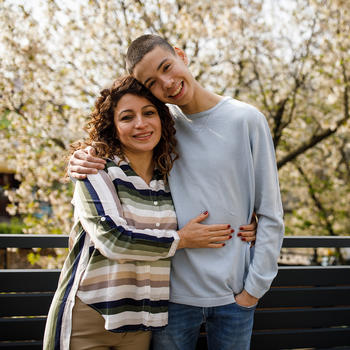An old African proverb says, “it takes a village to raise a child.” But when that village faces structural and systemic barriers, perhaps it takes a little more. A research team, for example, dedicated to community-based participatory action research.

For the past decade, a team of researchers from George Mason University’s College of Education and Human Development (CEHD) has worked with mothers from Latine immigrant communities in Alexandria to help define specific structural and systemic barriers faced by caregivers and children in school and find solutions that meet community expectations and needs. Using an approach to research called community-based participatory action research (CBPAR), this team is helping transform how Alexandria public schools supports its immigrant students and their parents.
“CBPAR flips the script of traditional research,” explained Colleen Vesely, associate professor of early childhood education and member of the research team. “We partner directly with communities, often those which have been pushed to the margins, to do research with them, as opposed to research on them.”
A key part of CBPAR work is the formation of an advisory board. Amigas de la Comunidad—the board formed as part of this project—brings Latine mothers from Alexandria together to act as the liaison between researchers and the Latine immigrant community, as well as the Latine immigrant community and children- and family-serving organizations, institutions, and systems. They serve as co-researchers, directing the Mason team and helping them connect with local schools and community leaders, so together, Amigas and the research team can understand which projects will directly benefit the community.
“‘The spirit of a fighter’: Mixed-status Latine immigrant families' experiences during COVID” is their most recent publication: A study formed as a direct result of the advisory board’s concerns around how COVID-19 lockdown was impacting families and children. The paper details two years’ worth of interviews with families throughout the lockdown.
“We’re hearing and seeing concerns in local schools around bullying, substance abuse, and suicidal ideation in the aftermath of lockdown,” said associate professor of counseling Rachael Goodman, another member of the research team. “We’re hoping the data we gathered from these conversations during lockdown can help contextualize why this is happening, and how we might be able to mitigate some of that trauma.”
Because CBPAR is responsive to a community’s needs, this means outcomes of the research can lead to more immediate solutions. After hearing a need for support in the COVID-19 study, the team has worked with the advisory board and the school system to develop parent support groups. The team also had a hand in improving food distribution systems during lockdown, when the school meal distribution system wasn’t aligning with the needs of the community.
“Our project on mixed-status Latine families during the COVID-19 lockdowns was just one of many projects we’ve done with this group,” explained Vesely.
Bethany Letiecq, associate professor of research methodology and one of the researchers, noted that over the years of this work, the Alexandria school system has learned the role Amigas de la Comunidad plays in building bridges between the immigrant community and the surrounding systems and structures.
“Amigas has become their go-to group to make sure they’re aligning their services to the needs of the Latine immigrant community,” she said. “They’re sitting with the superintendent and other school leaders, they’re able to directly ask for needed resources, and the school system administrators value their knowledge and expertise. That’s huge.”
While their work with Amigas de la Comunidad continues, the researchers hope that by publishing this particular study this approach will become a model for family engagement and community work to change systems one step at a time.
“There are so many communities in this country where families feel marginalized and who don’t feel that they have a say in their communities,” said Professor Emerita of Education and research team member Betsy DeMulder. “We want to change that.”
“Ultimately,” Goodman said, “the goal of this kind of work is to change structures and systems to better support and serve marginalized communities.”
This mission extends to the academy as well. Amigas de la Comunidad is included in the author line of the team’s published works. DeMulder said that doesn’t happen in other forms of research, “but these women are involved in every step. They have their own expertise that is critical to our work. We wouldn’t be able to do this without their support and trust.”
That same trust and support is apparent among the team members as well. “It’s deeply collaborative research, and it requires a very high level of trust and teamwork between us in order to be successful,” said Vesely. “Including how we position each other at different stages of our careers and highlight each person’s role in the work. This collaboration and partnership has been incredibly important and meaningful to me.”
“We learn from and rely on one another,” Letiecq said. “To form a partnership with other women who are committed to supporting each other's liberation and empowerment, to resisting further marginalization and overcoming those barriers, has been so rewarding.”
“These are long-term commitments and therefore long-term relationships, both amongst us as the research team and with the community. It’ll be a decade this year that we’ve sat around the table with these women, and that’s a radical difference from the ways research is traditionally done,” said Goodman. “It makes our work better, and the impact of our research more sustainable.”
Related News
- July 11, 2025
- July 9, 2025
- July 1, 2025
- June 2, 2025
- May 29, 2025
